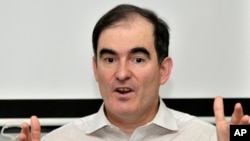UNITED NATIONS —
A senior U.N. humanitarian official warned Thursday that separating Muslims and Christians in the Central African Republic (C.A.R.) is not the solution to the country’s inter-communal violence.
John Ging, the Operations Director for the U.N.’s Humanitarian division, said the country’s minority Muslims feel trapped and want to be evacuated from their neighborhoods because they feel threatened by Christian self-defense militias.
“It has resulted in the segregation and separation of communities. People are now overtaken - as a result of their experience of the violence - they are overtaken by fear. They are also being radicalized and manipulated by the different leaderships to believe that a solution is segregation and separation,' said Ging.
Ging was recently in the C.A.R. on his second mission there in the past three months. He said the situation is continuing to deteriorate at an alarming rate.
Nearly one million people have been displaced by the violence between mainly Christian anti-Balaka militias attacking Muslim Seleka rebels. Seleka forces overthrew the government just over a year ago. The U.N. says more than half the country’s population is in need of aid.
Ging said that humanitarians have had to help thousands of civilians evacuate in Bossangoa, Bangui and elsewhere because they were under threat from anti-Balaka fighters. In one town he visited, Boda, he said there were 24,000 Muslims appealing for evacuation. In a sign of the inter-communal tensions, he said some Christian leaders were also encouraging the U.N. to help the Muslims leave.
“This is the ugly dynamic, the ugly face to this conflict where the intolerance, the incapacity for dialogue, attempts at dialogue between the communities in Boda have failed so far. Needless to say - needless to say - this is not the solution," he said.
Ging pointed out that the Central African Republic has a long history of religious tolerance among its communities and with help from the international community could stop the violence.
The U.N. will be sending a force of nearly 12,000 peacekeepers to the country in mid-September. Until then, about 8,000 French and African personnel are trying to stem the violence and protect civilians. The European Union has also deployed about 1,000 soldiers, but the U.N. secretary-general has appealed for more.
In addition to insecurity, the country is facing massive humanitarian challenges. Despite appeals to donors, the U.N. fund for C.A.R. is less than one-third funded, and there are shortages of food, medicines and other life-saving supplies. The situation will likely become more dire now that the rainy season has begun.
John Ging, the Operations Director for the U.N.’s Humanitarian division, said the country’s minority Muslims feel trapped and want to be evacuated from their neighborhoods because they feel threatened by Christian self-defense militias.
“It has resulted in the segregation and separation of communities. People are now overtaken - as a result of their experience of the violence - they are overtaken by fear. They are also being radicalized and manipulated by the different leaderships to believe that a solution is segregation and separation,' said Ging.
Ging was recently in the C.A.R. on his second mission there in the past three months. He said the situation is continuing to deteriorate at an alarming rate.
Nearly one million people have been displaced by the violence between mainly Christian anti-Balaka militias attacking Muslim Seleka rebels. Seleka forces overthrew the government just over a year ago. The U.N. says more than half the country’s population is in need of aid.
Ging said that humanitarians have had to help thousands of civilians evacuate in Bossangoa, Bangui and elsewhere because they were under threat from anti-Balaka fighters. In one town he visited, Boda, he said there were 24,000 Muslims appealing for evacuation. In a sign of the inter-communal tensions, he said some Christian leaders were also encouraging the U.N. to help the Muslims leave.
“This is the ugly dynamic, the ugly face to this conflict where the intolerance, the incapacity for dialogue, attempts at dialogue between the communities in Boda have failed so far. Needless to say - needless to say - this is not the solution," he said.
Ging pointed out that the Central African Republic has a long history of religious tolerance among its communities and with help from the international community could stop the violence.
The U.N. will be sending a force of nearly 12,000 peacekeepers to the country in mid-September. Until then, about 8,000 French and African personnel are trying to stem the violence and protect civilians. The European Union has also deployed about 1,000 soldiers, but the U.N. secretary-general has appealed for more.
In addition to insecurity, the country is facing massive humanitarian challenges. Despite appeals to donors, the U.N. fund for C.A.R. is less than one-third funded, and there are shortages of food, medicines and other life-saving supplies. The situation will likely become more dire now that the rainy season has begun.











